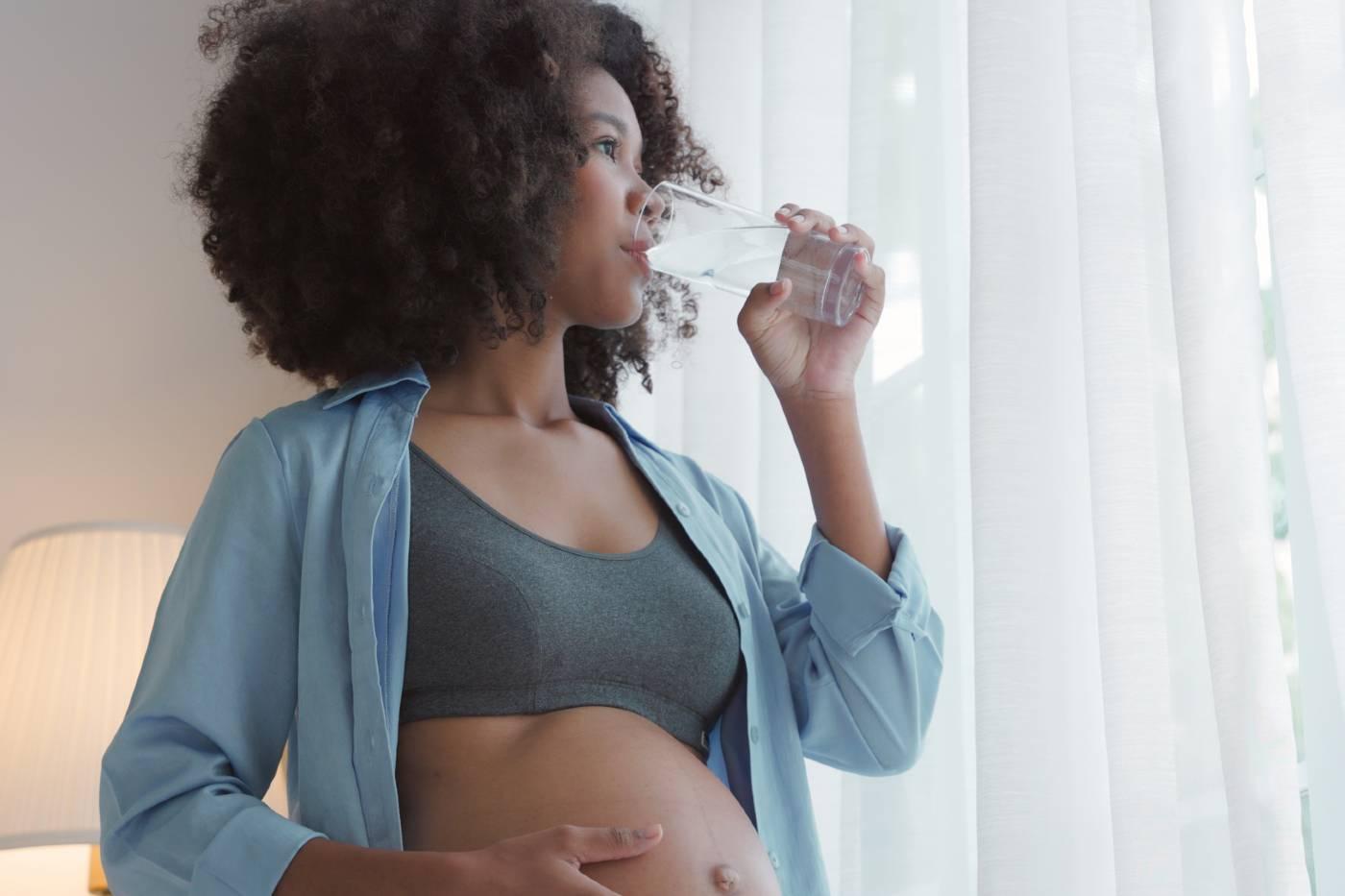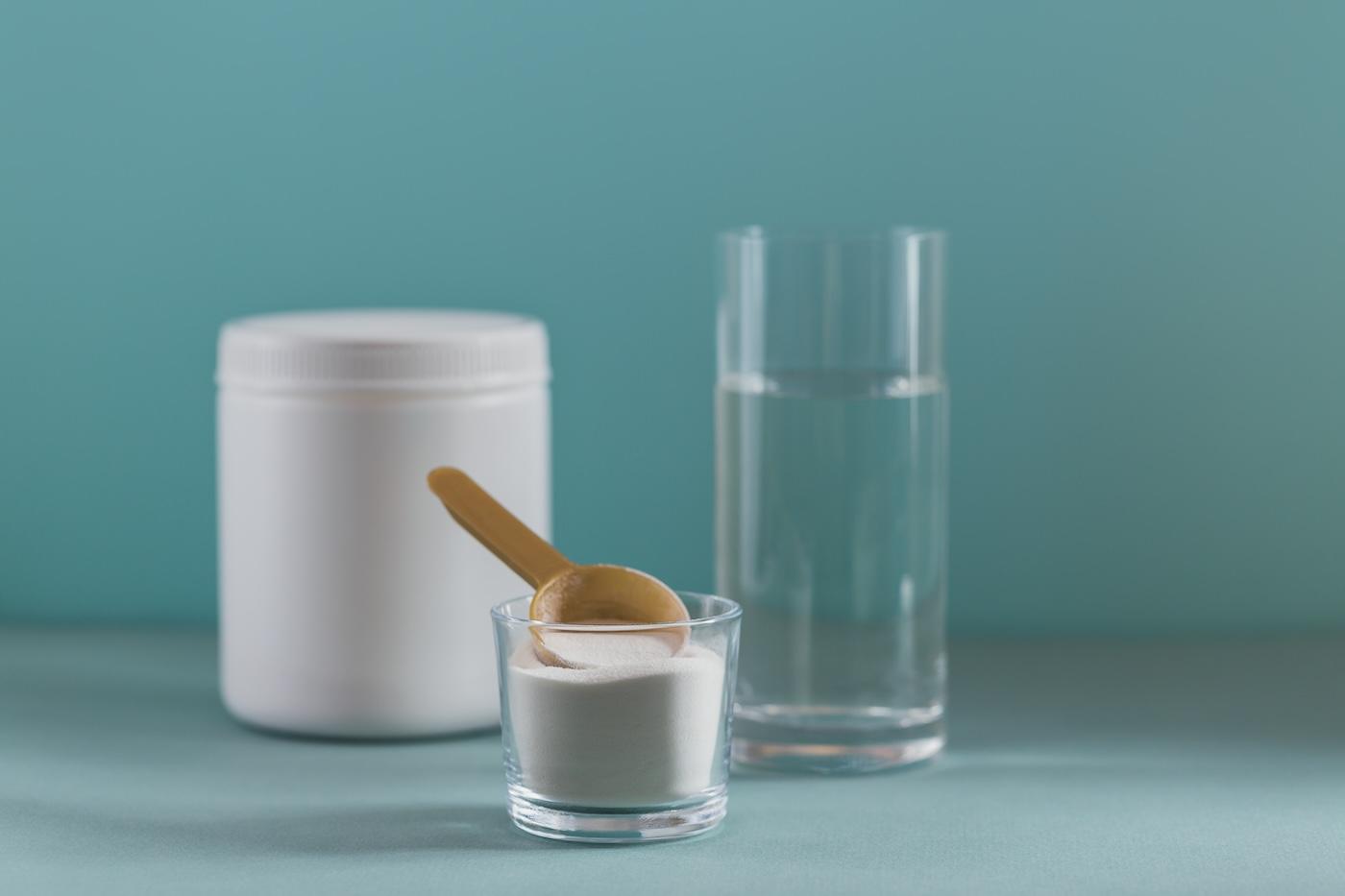PREGNANCY
The Importance of Hydration During Pregnancy
Drink up! Learn why your water intake during pregnancy is crucial to your health and your baby’s.

Written by
Holly Pevzner

While it’s almost expected to be unsure about drinking wine or coffee during pregnancy, there’s another beverage that’s stirring up pregnancy confusion—and that’s water. Unlike with alcohol or caffeine, however, pregnant folks aren’t stressed about drinking too much water. Instead, they’re worried about not getting enough. And research shows there's a good reason for that concern. The risk of becoming dehydrated during pregnancy due to insufficient fluid intake is “relatively high,” according to a 2020 report in the journal BMC Pregnancy and Childbirth. In fact, one study found that over 50% of pregnant individuals experience dehydration during their pregnancy. Keep reading to learn how much water you need while pregnant—and why. Plus, get some tips to make staying hydrated during pregnancy easy-peasy!
How much water do I need during pregnancy?
During pregnancy, it’s important to drink 64 to 96 ounces (or 8 to 12 cups) of water every day, according to the American College of Obstetricians and Gynecologists (ACOG). For perspective, that means you’ll need to drink down Stanley’s TikTok-famous 40-ounce Quencher water bottle twice a day to hit the midrange water goal. While ACOG’s water recommendations during pregnancy don’t differentiate by trimester, research in the European Journal of Nutrition found that “under-hydration” typically occurs during the second trimester and early in the third trimester, indicating pregnant folks pay special attention to water intake during this time.
Why is drinking water so important during pregnancy?
Water makes up roughly 60% of the body and it plays a key role in almost every bodily function, like nutrient absorption, digestion, waste removal, and temperature regulation. When you’re carrying a baby, the importance of water increases. You need more water to…
- Help form the amniotic fluid around your baby-to-be
- Produce extra blood
- Build new tissue
- Reduce pregnancy-related swelling
- Help prevent pregnancy-related constipation and hemorrhoids
- Decrease chance of urinary tract infections
- Decrease risk of preterm labor and preterm birth
What happens if I don’t drink enough water while pregnant?
When you’re pregnant, you’re already more susceptible to swelling, urinary tract infections, constipation, and hemorrhoids. Add dehydration to the mix, and your risk goes even higher for all the above. In addition, not getting proper hydration throughout your pregnancy may increase your chances of…
- Overheating: When you’re expecting, the extra blood in your body causes you to feel hotter than usual. If you’re under-hydrated, that’ll further interfere with your body’s ability to keep you cool and comfy.
- Braxton-Hicks contractions: The number one cause of “false labor,” otherwise known as Braxton-Hicks contractions, is dehydration. Even minor dehydration can cause them!
- Headaches: Drinking plenty of water and getting enough sleep during pregnancy help to prevent pregnancy headaches. (FYI: Pregnancy headaches can sometimes be a symptom of preeclampsia. Learn about preeclampsia.)
- Reduced amniotic fluid: Also called oligohydramnios, low amniotic fluid may be responsible for issues like umbilical cord compression, but drinking lots of water may help increase the amount of amniotic fluid.
- Low birth weight: Studies have shown that chronic dehydration during pregnancy affects the weight and length of babies at birth—even their head and chest circumference.
- Kidney stones: According to experts, drinking enough fluids each day is the best way to avoid getting kidney stones in pregnancy.
How do I know if I am dehydrated in pregnancy?
Thirst is only one sign of dehydration, which is when your body loses fluids faster than you can take them in. Here are some other clues you’re dehydrated in pregnancy:
- You’re unable to urinate.
- You’re producing less urine than usual.
- Your pee is dark yellow.
- You can’t keep fluids down.
- Your mouth feels dry and sticky.
- You’re dizzy or you faint when you stand up.
- Your heart pounds or races.
- You’re feeling hot.
- You’re experiencing headaches.
- You’re constipated.
How can I increase my water intake during pregnancy?
Drink more water! But of course, you already know that! Here are some tips to help make that happen—plus, other strategies to keep you well hydrated throughout your pregnancy:
- Jazz up your water. Add lemon or lime slices, cucumber slices, frozen berries, or fresh sprigs of mint to your water for a subtle splash of flavor.
- Eat more fruits and veggies. Make sure high-water produce, like citrus, melon, celery, and cucumbers, are in heavy rotation.
- Amp up other fluids. Milk, sparkling water, decaffeinated tea, and soup are hydrating, too!
- Set drink-up reminders. Don’t wait until you’re thirsty to swig some water—set reminders on your phone to cue you to drink throughout the day.
Other ways to ward off dehydration include staying out of the heat, exercising inside—or early or late in the day—when temperatures are high, upping your fluid intake when you up your activity level, and monitoring your pee so that it’s always colorless or light yellow.
How do I stay hydrated with morning sickness?
Morning sickness affects 70% of all pregnant people—and the less hydrated you are, the more nauseated you’ll get! To help hydrate when you’re feeling icky, try to:
- Suck ice cubes.
- Eat popsicles made with 100% fruit juice.
- Drink with cold water, which is easier to get down when nauseated.
- Eat high-water produce.
- Enjoy smoothies.
- Drink iced ginger tea for hydration and to help quell nausea, too.
- Eat protein-rich foods to help stave off nausea which will encourage you to drink more.
How much water should I drink while breastfeeding?
Nursing parents lose an average of 25 ounces of fluid each day through their breastmilk. If those fluids aren’t constantly replaced with water and other liquids, your breastmilk supply will falter. After all, breastmilk is more than 80% water. That means, in order to help maintain your milk supply, you will actually need to drink more water while breastfeeding than you did when pregnant. In fact, a nursing parent needs about 128 ounces (or 16 cups) of water a day, according to the Academy of Nutrition and Dietetics. (Drinking more than that, however, has not been proven to boost your breastmilk supply.) The best way to stay properly hydrated while breastfeeding is to drink about 8 ounces of water whenever you’re nursing, thirsty, and eating. Learn more about how to maintain—and boost—your breastmilk supply.
More on Pregnancy Health and Nutrition:
- Healthy Pregnancy Meal Plans and Recipes
- A Guide to Pregnancy Weight Gain
- What “Eating for Two” Really Means
- Natural Ways to Relieve Pregnancy Heartburn
- Why Folic Acid Is So Important During Pregnancy
***
REFERENCES
- Associations between hydration state and pregnancy complications, maternal-infant outcomes: protocol of a prospective observational cohort study. BMC Pregnancy and Childbirth. February 2020
- Effect of dehydration during pregnancy on birth weight and length in West Jakarta. Journal of Nutritional Science. August 2021
- American College of Obstetricians and Gynecologists (ACOG): How much water should I drink during pregnancy?
- Variation in urine osmolality throughout pregnancy: a longitudinal, randomized-control trial among women with overweight and obesity. European Journal of Nutrition. July 2021
- U.S. Geological Survey: The Water in You: Water and the Human Body
- Dignity Health: Dehydration During Pregnancy: What Expecting Mothers Should Know
- Intermountain Health: How Hydration During Pregnancy Can Benefit You and Your Baby
- ACOG: Urinary Tract Infections in Pregnant Individuals
- UnityPoint Health: 10 Things No One Expects During a Summer Pregnancy
- UTSouthwestern Medical Center: False alarm: Braxton Hicks contractions vs. true labor
- Maternal hydration for increasing amniotic fluid volume in oligohydramnios and normal amniotic fluid volume. Cochrane Database of Systematic Reviews. January 2002
- March of Dimes: Oligohydramnios
- A Study of the Fluid Intake, Hydration Status, and Health Effects among Pregnant Women in Their Second Trimester in China: A Cross-Sectional Study. Nutrients. April 2023
- University of Michigan Health: Kidney Stones in Pregnancy
- ACOG: Morning Sickness: Nausea and Vomiting of Pregnancy
- CHI Saint Joseph Health: Dehydration During Pregnancy: What Expecting Mothers Should Know
- Quantifying the global rates of nausea and vomiting of pregnancy: a meta analysis. Journal of Population Therapeutics and Clinical Pharmacology. July 2013
- Salem Health Hospitals & Clinics: Pregnant? 8 tips for minimizing morning sickness and constipation
- Herbal medicine use by pregnant women in Bangladesh: a cross-sectional study. BMC Complementary Medicine and Therapies. December 2018
- Nausea and Vomiting of Pregnancy. Gastroenterology Clinics of North America. June 2013
- John Hopkins Medicine: 5 Breastfeeding Diet Myths
- World Health Organization: Breastfeeding
- Extra fluids for breastfeeding mothers for increasing milk production. Cochrane Database of Systematic Reviews. November 2023
Disclaimer: The information on our site is NOT medical advice for any specific person or condition. It is only meant as general information. If you have any medical questions and concerns about your child or yourself, please contact your health provider.
SHARE THIS ARTICLE
MOST LOVED
Sleepytime Sidekicks
More on Pregnancy
About Holly Pevzner
Holly Pevzner is Happiest Baby’s Staff Writer. She specializes in creating parenting, pregnancy, health, nutrition, and family travel content. Her work—including essays, columns, reported features, and more—has appeared in outlets such as EatingWell, Family Circle, Parents, Real Simple, and The Bump. Before becoming a full-time writer, Holly held senior staff positions at Prevention, Fitness, and Self magazines, covering medical health and psychology. She was also a contributing editor at Scholastic Parent & Child magazine and a regular kids-health columnist for Prevention and First For Women magazines. Holly lives in Los Angeles with her husband, two boys, and terrier mix.












